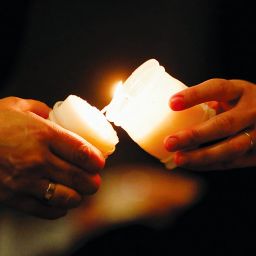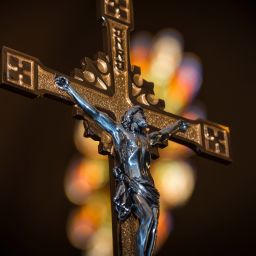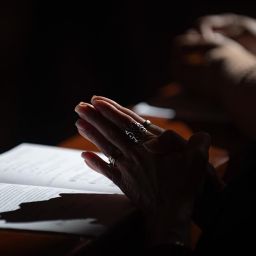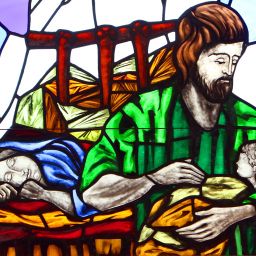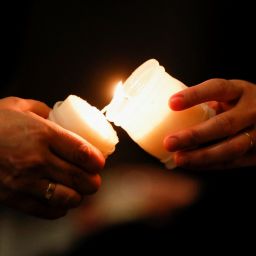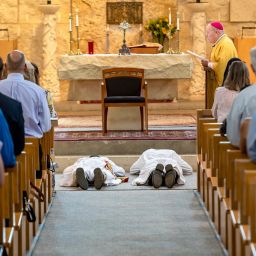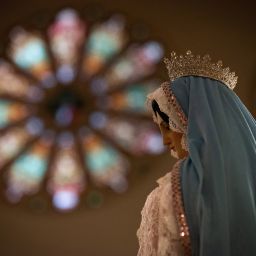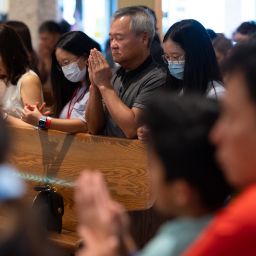By Father Thomas Esposito, O. Cist.
Special to The Texas Catholic
No easy interpretation of Genesis 22 exists. The account of God’s test of Abraham is truly awe-ful. It gives us no psychological insights into the heart of Abraham or Isaac, and the sparse narrative details — the three days’ journey, the binding of Isaac upon the altar, the dramatic angelic intervention to stay Abraham’s knife — are terrifying in their raw simplicity. Yet these verses offer wondrous cause for meditation on the mystery of sacrifice.
God tells Abraham, “Take your son, your only one, the one whom you love — Isaac — and go to the land of Moriah. There offer him up as a burnt offering on one of the heights that I will point out to you” (Genesis 22:2). Mount Moriah is mentioned in only one other biblical passage: 2 Chronicles 3:1, which provides precise coordinates for Moriah: “Then Solomon began to build the house of the Lord in Jerusalem on Mount Moriah, which had been shown to David his father…” Once built, the Jerusalem Temple becomes the exclusive place where the sacrifices described in the Torah could be offered. Between these two references to Mount Moriah lies an essential truth about the intention God requires of those who offer sacrifices. Abraham is ultimately not asked to offer up his son as a holocaust, yet his unconditional commitment to the Lord disposes him to relinquish the promised future he had so desperately desired for decades. Abraham’s life and faithful love are summed up in the Genesis scene, which becomes the exemplar for every future sacrifice. All Israelites who read Genesis 22 and offer their sacrifices at that very site understand the severity of sacrifice: Your everything must go into your every offering; you must leave nothing back for yourself if you are to serve the Lord with your whole heart, soul, and strength (Deuteronomy 6:4).
Christians see in Genesis 22 the model for a sacrifice that is only completed after Abraham’s death. Jesus Christ takes the role of Isaac, the innocent son who carries the wood for the sacrifice on His back to Calvary; and just as God provides a ram for Abraham to slaughter as a substitutionary sacrifice (Genesis 22:13), so Jesus offers Himself as “the lamb of God” whose self-offering “takes away the sin of the world” (John 1:29). But Jesus, like Abraham, also plays the role of the priest performing the sacrifice. In that one self-emptying act of supreme love on Calvary, just a short walk from Mount Moriah and the Temple, Christ is the priest, the altar, and the sacrifice itself (see Hebrews 9-10).
Our reception of that sacrifice, the celebration of the Eucharist, reminds us of the beautiful and little-known truth that every baptized Christian has a priestly role in the Church. While only a few are called to Holy Orders and the ministerial priesthood, the common priesthood of all the faithful is a privilege extended to believers by virtue of their baptism. This teaching has deep roots in Scripture. Just as Moses and the Israelites are consecrated to God as “a kingdom of priests, a holy nation” (Exodus 19:6), Christians are likewise exhorted to “let yourselves be built into a spiritual house to be a holy priesthood, offering spiritual sacrifices acceptable to God through Jesus Christ” (1 Peter 2:5).
St. Paul is equally aware of this liturgical mystery by which every baptized person participates in the one self-offering of Christ: “I urge you therefore, brothers and sisters, by the mercies of God, to offer your bodies as a living sacrifice, holy and pleasing to God, your spiritual worship” (Romans 12:1).
But what do “spiritual sacrifices” and “a living sacrifice” look like? According to the Vatican II document “Lumen Gentium,” all baptized persons “exercise that priesthood in receiving the sacraments, in prayer and thanksgiving, in the witness of a holy life, and by self-denial and active charity” (paragraph 10). Another beautiful paragraph reminds the faithful that they have an active role to play at Mass: “Taking part in the Eucharistic sacrifice, which is the fount and apex of the whole Christian life, they offer the Divine Victim to God, and offer themselves along with It” (paragraph 11).
A sacrifice is simply the act of making something holy (from the Latin words sacrum and facere). Our priestly privilege allows us to unite our little offerings with the bread and wine at every Mass. May this Lenten season inspire you to ponder what you can sacrifice, that is, make holy, among your actions, memories, relationships, and desires as you bring them before the Eucharistic Lord.
Father Thomas Esposito, O. Cist., is a monk at the Cistercian Abbey of Our Lady of Dallas and teaches in the theology department at the University of Dallas.


